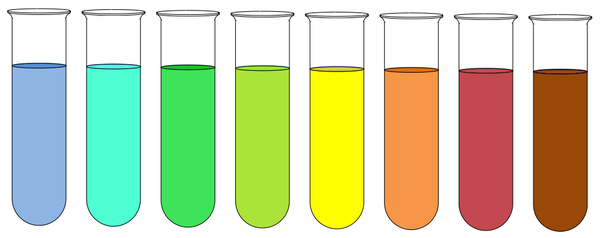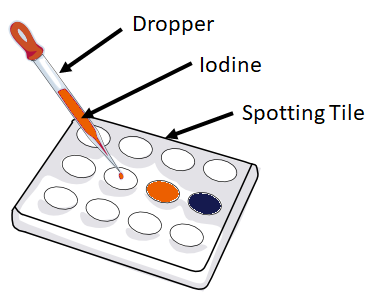Difference between revisions of "GCSE Biology Required Practical: Food Tests"
| Line 2: | Line 2: | ||
===Meaning=== | ===Meaning=== | ||
Use a range of tests to identify the presence of [[Carbohydrate]]s, [[Protein]]s and [[Lipid]]s in food samples. | Use a range of tests to identify the presence of [[Carbohydrate]]s, [[Protein]]s and [[Lipid]]s in food samples. | ||
| − | ===Method=== | + | ===Methods=== |
| − | + | ====Testing For Monosaccharides==== | |
| − | + | : [[Monosaccharide]]s can be detected with the [[Benedict's Test]]. | |
| − | + | : [[Disaccharide]]s cannot be detected with the [[Benedict's Test]] unless you first react it with dilute [[Hydrochloric Acid|hydrochloric acid]]. | |
| − | + | =====Method===== | |
| + | #A sample of food is dissolved in water. | ||
| + | #The solution is added to blue Benedict's solution in a boiling tube. | ||
| + | #The solution is kept at 90°C for up to 10 minutes. | ||
| + | #A colour change indicates the presence of [[glucose]] or [[fructose]]. If they are present the solution will eventually turn brick red or brown. | ||
| + | {| class="wikitable" | ||
| + | |- | ||
| + | |[[File:BenedictsTest.png|center|600px]] | ||
| + | |- | ||
| + | | style="height:20px; width:600px; text-align:center;" |When sugar is present the Benedict's solution turns from blue through several colours until it becomes brick red or brown. | ||
| + | If this was done with sucrose the Benedict's solution would stay blue. | ||
| + | |} | ||
| + | |||
| + | ====Testing for Starch==== | ||
| + | : [[Starch]] can be detected using Iodine Solution. | ||
| + | =====Method===== | ||
| + | #A small sample of food is placed on a spotting tile. | ||
| + | #A drop of Iodine Solution is added to the food sample. | ||
| + | #If the Iodine solution turns from orange to blue-black then the food contains [[starch]]. | ||
| + | {| class="wikitable" | ||
| + | |- | ||
| + | |[[File:IodineStarch.png|center|400px]] | ||
| + | |- | ||
| + | | style="height:20px; width:400px; text-align:center;" |Iodine solution is an orange liquid. When the iodine solution is added to starch the iodine solution turns from orange to blue-black. | ||
| + | |} | ||
Revision as of 20:13, 21 November 2018
Contents
Key Stage 4
Meaning
Use a range of tests to identify the presence of Carbohydrates, Proteins and Lipids in food samples.
Methods
Testing For Monosaccharides
- Monosaccharides can be detected with the Benedict's Test.
- Disaccharides cannot be detected with the Benedict's Test unless you first react it with dilute hydrochloric acid.
Method
- A sample of food is dissolved in water.
- The solution is added to blue Benedict's solution in a boiling tube.
- The solution is kept at 90°C for up to 10 minutes.
- A colour change indicates the presence of glucose or fructose. If they are present the solution will eventually turn brick red or brown.
| When sugar is present the Benedict's solution turns from blue through several colours until it becomes brick red or brown.
If this was done with sucrose the Benedict's solution would stay blue. |
Testing for Starch
- Starch can be detected using Iodine Solution.
Method
- A small sample of food is placed on a spotting tile.
- A drop of Iodine Solution is added to the food sample.
- If the Iodine solution turns from orange to blue-black then the food contains starch.
| Iodine solution is an orange liquid. When the iodine solution is added to starch the iodine solution turns from orange to blue-black. |

